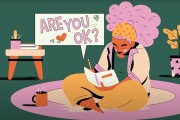Starting the Conversation
Whatever gets you talking
Opening the door to begin a conversation can really help. Not sure where to start? Try one of these opening lines to help make starting the conversation easier.
Find a moment to talk
Beginning the conversation doesn’t mean you have to dive straight into talking about mental health struggles or have an intense heart to heart. Consider instead meeting your friend where they are or extending an invitation to hang out. You can even talk about struggles you are going through to give your friend an avenue to open up. Whether it's over a bite to eat or taking a walk, a simple “what’s up” is a great place to begin.
Need some ideas of how to start the conversation? Try one of these:

Ask a friend to play a pick-up game of your favorite sport.

Casually ask while playing an online game together.

Invite them to grab food after class.

Ask “what’s up” in a DM or text.

Have a shared hobby? Use that activity as an opportunity to check in.

Invite them to go on a walk or take a drive around the neighborhood.
Resources to help you start the conversation
| How to talk to my friends |
Some of us are open and honest with our close friends about our challenges and feelings, and some of us are more private. There is no “right” way to share what you’re going through — every friendship or relationship is different. |
| How to talk to my parents or guardian |
Some conversations are “bigger” than others, and it’s normal to feel uncertain or worried about sharing something personal or emotional. So, how do you have this conversation? |
| How to Disclose Your Mental Health Condition |
We constantly make decisions about what personal information to share with others. When it comes to disclosing the details of our mental health, there is no one “right” way to share — some people can express their thoughts and feelings easily, while others take more time to open up and confide in a new person. |
| Support your loved one after a suicide attempt |
Let your loved one know you care. One of the most powerful things you can do is to be present and supportive. Even when you don’t know what to say, just be with them and listen to their concerns. Let them know their life matters to you. |
| What to do when someone is at risk |
If you think someone is thinking about suicide, assume you are the only one who will reach out. Here’s how to talk to someone who may be struggling with their mental health. |
| Say It Out Loud |
Created by young people for young people, NAMI Say It Out Loud is a free online card game that will bring you closer to your friends through conversation prompts about life, relationships, and mental health. |
| Talk Away the Dark |
You can make a difference by learning the warning signs, knowing the risk factors, and bravely having a REAL open and honest conversation with someone you care about. |
Resources
Don’t feel like these would spark the conversation?
Check out our additional resources page for ways to navigate tougher conversations about break-ups, anxiety, depression, death of a loved one, or abuse.